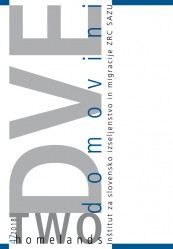Dinamika drugačenja v aktivizmu kot del nemške »Willkommenskultur« po letu 2015
DOI:
https://doi.org/10.3986/dd.2018.1.04Ključne besede:
drugačenje, Willkommenskultur, aktivizem, humanitarizem, begunciPovzetek
Članek kritično obravnava sodelovanje aktivistov v močno hvaljeni nemški Willkommenskultur ('kulturi dobrodošlice'). Z izhodiščem v humanitarnem delu proučuje različne načine drugačenja beguncev s strani aktivistov kljub na videz dobrim namenom ali prav zaradi njih. Analiza intervjujev z aktivisti iz severne Nemčije je pokazala, da so različne oblike drugačenja odvisne od njihove angažiranosti in osebnostnih lastnosti, kot je na primer odsotnost njihove osebne begunske izkušnje. Izključevalno drugačenje večinoma uporabljajo aktivisti, ki se ne zavedajo hierarhije moči, medtem ko vključevalno drugačenje uporabljajo predvsem aktivisti, ki se poskušajo z begunci bolj enakopravno povezovati.
Prenosi
Literatura
Agier, Michel (2011). Managing the Undesirables: Refugee Camps and Humanitarian Government. Cambridge: Polity Press.
Aronson, Elliot, Wilson, Timothy, Akert, Robin (2014). Sozialpsychologie. Hallbergmoos: Pearson Deutschland.
Attia, Iman (2015). “Die westliche Kultur” und ihr Anderes: Zur Dekonstruktion von Orientalismus und antimuslimischem Rassismus. Bielefeld: Transcript Verlag.
Barnett, Michael N. (2013). Humanitarian Governance. Annual Review of Political Science 16, 379–398.
Bertelsmann Stiftung (2012). Deutschland öffne dich! Willkommenskultur und Vielfalt in der Mitte der Gesellschaft verankern. Gütersloh: Verlag Bertelsmann Stiftung.
Brossard Borhaug, Frédérique (2016). How to Challenge a Culturalization of Human Existence? Promoting Interculturalism and Ethical Thinking in Education. Ambivalence 3/1, 1–15.
Bundesamt für Migration und Flüchtlinge (2016). Das Bundesamt in Zahlen 2015. Asyl, Migration und Integration, http://www.bamf.de/SharedDocs/Anlagen/DE/Pub likationen/Broschueren/bundesamt-in-zahlen-2015.pdf;jsessionid=642E059F-3D063E1A39EE0ED8EC2DDAD9.1_cid359?__blob=publicationFile (22. 12. 2016).
Calhoun, Craig (2010). The Idea of Emergency: Humanitarian Action and Global (Dis) Order. Contemporary States of Emergency: The Politics of Military and Humanitarian Interventions (eds. Didier Fassin, Mariella Pandolfi). New York: Zone Books.
Canales, Mary (2000). Othering: Toward an Understanding of Difference. Advances in Nursing Science 22/4, 16–31.
Dworkin, Gerald (1972). Paternalism. The Monist 56, 64–84.
Fischhaber, Anna (2015). Was hinter der Hilfsbereitschaft der Deutschen steckt, http://www.sueddeutsche.de/leben/willkommenskultur-fuer-fluechtlinge-was-hinterder-hilfsbereitschaft-der-deutschen-steckt-1.2642991 (26. 11. 2016).
Flick, Uwe (2009). An Introduction to Qualitative Research. London: SAGE.
Fuad Luke, Alastair (2009). Design Activism: Beautiful Strangeness for a Sustainable World. Abingdon: Earthscan.
Hadley, Louisa (2013). The Language of Othering, https://inspire.dawsoncollege.qc.ca/2013/11/13/the-language-of-othering/ (30. 12. 2016).
Hall, Stuart (1992). Representations: Cultural Representations and Signifying Practices. London, Thousand Oaks, New Dehli: SAGE.
Harrebye, Silas (2016). Social Change and Creative Activism in the 21st century: The Mirror Effect. London: Palgrave Macmillan.
Harrel Bond, Barbara (2002). Can Humanitarian Work with Refugees be Humane? Human Rights Quarterly 24/1, 51–85.
Heckmann, Friedrich (2014). Was bedeutet “Willkommenskultur“? Vertretung der Friedrich-Ebert-Stiftung in der Russischen Föderation, 1–8.
Howe, Lorien (2015). The Problematic Nature of Humanitarian Aid. Undergraduate Honors Theses. Paper 804.
Jensen, Sune Q. (2011). Othering, Identity Formation and Agency, Qualitative Studies 2/2, 63–78.
Joffe, Josef (2015). Das deutsche Wunder, http://www.zeit.de/2015/37/willkommenskultur-deutschland-fluechtlinge-zeitgeist (26. 11. 2016).
Krumer Nevo, Michal, Sidi, Mirit (2012). Writing against Othering. Qualitative Inquiry 18/4, 299–309.
Mamdani, Mahmood (1973). From Citizen to Refugee: Ugandan Asians come to Britain. Kampala: Pambazuka Press.
Martin, Roger L., Osberg, Sally (2007). Social Entrepreneurship: The Case for Definition. Stanford: Leland Stanford Jr. University.
Mayring, Philipp (2015). Qualitative Inhaltsanalyse: Grundlagen und Techniken. 12th ed. Weinheim, Basel: Beltz.
Mead, Tania S. (2015). Between Care and Control: The Uses and Abuses of Humanitarianism in Contemporary Migration Debates. Vancouver: The University of British Columbia.
Nussbaum, Martha C. (1995). Objectification. Philosophy & Public Affairs 24/4, 249–291.
Olsen, Christopher, El-Bialy, Rowan, Mckelvie, Mark, Rauman, Peggy, Brunger, Fern (2016). “Other“ Troubles: Deconstructing Perceptions and Changing Responses to Refugees in Canada. Journal of Immigrant and Minority Health 18/1, 58–66.
Pallister Wilkins, Polly (2015). The Humanitarian Politics of European Border Policing. Frontex and Border Politics in Evros. International Political Sociology 9, 53–69.
Tezcan, Levent (2011). Spielarten der Kulturalisierung. Zeitschrift für Kulturphilosophie 5/2, 357–376.
Prenosi
Objavljeno
Kako citirati
Številka
Rubrike
Licenca

To delo je licencirano pod Creative Commons Priznanje avtorstva-Nekomercialno-Brez predelav 4.0 mednarodno licenco.
Avtorji jamčijo, da je delo njihova avtorska stvaritev, da v njem niso kršene avtorske pravice tretjih oseb ali kake druge pravice. V primeru zahtevkov tretjih oseb se avtorji zavezujejo, da bodo varovali interese založnika ter da bodo povrnili morebitno škodo.
Podrobneje v rubriki: Prispevki





